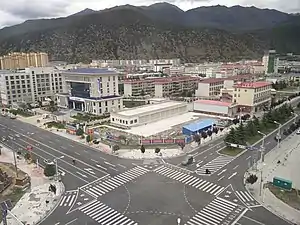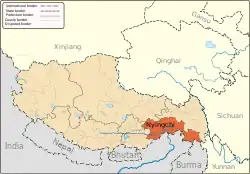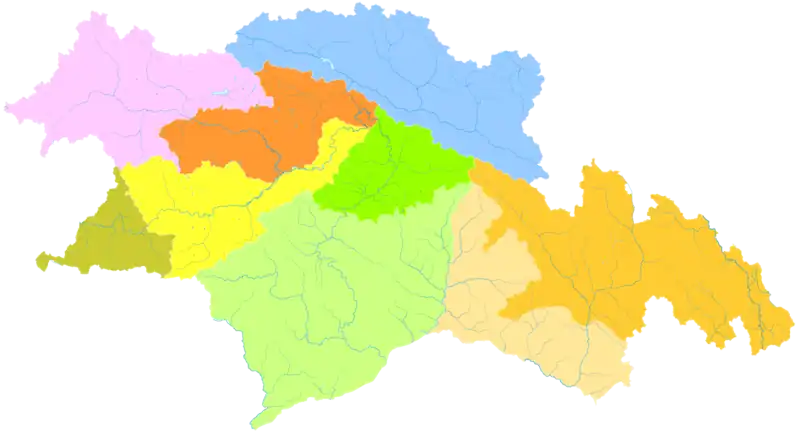Nyingchi
ཉིང་ཁྲི་གྲོང་ཁྱེར། · 林芝市 | |
|---|---|
 An intersection in Bayi, Bayi District, Nyingchi | |
 prefecture (orange) in Tibet Autonomous Region (light-orange) | |
| Coordinates (Nyingchi municipal government): 29°38′56″N 94°21′41″E / 29.6488°N 94.3614°E | |
| Country | People's Republic of China |
| Autonomous region | Tibet |
| City seat | Bayi District (Bayi Town) |
| Area | |
| • Total | 116,175 km2 (44,855 sq mi) |
| Population | |
| • Total | 200,000 |
| • Density | 1.7/km2 (4.5/sq mi) |
| Time zone | UTC+8 (China Standard) |
| ISO 3166 code | CN-XZ-04 |
| Nyingchi | |||||||
|---|---|---|---|---|---|---|---|
| Chinese name | |||||||
| Chinese | 林芝 | ||||||
| |||||||
| Tibetan name | |||||||
| Tibetan | ཉིང་ཁྲི་ས། | ||||||
| |||||||
Nyingchi (Wylie: nying khri grong khyer, THL: nying tri drong khyer, ZYPY: nyingchi chongkyêr), also known as Linzhi (Chinese: 林芝; pinyin: Linzhi) or Nyingtri, is a prefecture-level city in the southeast of the Tibet Autonomous Region in China. The administrative seat of Nyingchi is Bayi District.
Nyingchi is the location of Buchu Monastery.
Economy
Tourism

The average elevation of Nyingchi is 3,040 meters (9,974 feet), which is the lowest compared with the other prefectures in Tibet. The relatively low elevation compared to other regions of the Tibetan plateau yields a lower risk of Altitude sickness. Guangdong province announced in 2012 that it plans to invest more than RMB 400 million (US$63 million) in Nyingchi's tourism industry. According to the plan, Guangdong will help build 22 "prosperous model villages" in Nyingchi in counties such as Bomê and Zayü.[1]
Transportation
It takes about 5 hours to travel from Lhasa to Nyingchi by a highway opened at the end of 2018.[2] Nyingchi is connected to Lhasa by the 435-kilometer Lhasa–Nyingchi railway, completed in 2021. The journey from Lhasa by train takes 2.5 hours.[3]
The Linzhi Milin Airport was opened in Nyingchi in March 2017, which may be used to support both commercial air traffic and the People's Liberation Army Air Force.[4]
Climate
Köppen-Geiger climate classification system classifies its climate as subtropical highland (Cwb).[5]
| Climate data for Nyingchi (1991–2020 normals, extremes 1981–2010) | |||||||||||||
|---|---|---|---|---|---|---|---|---|---|---|---|---|---|
| Month | Jan | Feb | Mar | Apr | May | Jun | Jul | Aug | Sep | Oct | Nov | Dec | Year |
| Record high °C (°F) | 19.4 (66.9) |
20.2 (68.4) |
24.0 (75.2) |
25.3 (77.5) |
28.0 (82.4) |
29.0 (84.2) |
31.4 (88.5) |
29.6 (85.3) |
30.2 (86.4) |
24.5 (76.1) |
19.9 (67.8) |
16.7 (62.1) |
31.4 (88.5) |
| Mean daily maximum °C (°F) | 8.9 (48.0) |
10.9 (51.6) |
13.8 (56.8) |
17.0 (62.6) |
19.7 (67.5) |
21.7 (71.1) |
22.5 (72.5) |
22.4 (72.3) |
20.7 (69.3) |
17.5 (63.5) |
14.0 (57.2) |
10.3 (50.5) |
16.6 (61.9) |
| Daily mean °C (°F) | 1.1 (34.0) |
3.3 (37.9) |
6.3 (43.3) |
9.3 (48.7) |
12.4 (54.3) |
15.4 (59.7) |
16.5 (61.7) |
16.0 (60.8) |
14.3 (57.7) |
10.5 (50.9) |
5.8 (42.4) |
2.0 (35.6) |
9.4 (48.9) |
| Mean daily minimum °C (°F) | −4.6 (23.7) |
−2.1 (28.2) |
1.2 (34.2) |
4.3 (39.7) |
7.5 (45.5) |
11.2 (52.2) |
12.5 (54.5) |
12.0 (53.6) |
10.4 (50.7) |
5.8 (42.4) |
−0.1 (31.8) |
−3.8 (25.2) |
4.5 (40.1) |
| Record low °C (°F) | −15.3 (4.5) |
−13.3 (8.1) |
−10.1 (13.8) |
−4.6 (23.7) |
−1.6 (29.1) |
3.0 (37.4) |
3.9 (39.0) |
2.9 (37.2) |
−1.0 (30.2) |
−5.0 (23.0) |
−10.4 (13.3) |
−15.3 (4.5) |
−15.3 (4.5) |
| Average precipitation mm (inches) | 2.0 (0.08) |
4.1 (0.16) |
21.2 (0.83) |
47.9 (1.89) |
80.1 (3.15) |
125.2 (4.93) |
137.4 (5.41) |
128.2 (5.05) |
110.3 (4.34) |
37.3 (1.47) |
4.3 (0.17) |
0.7 (0.03) |
698.7 (27.51) |
| Average precipitation days (≥ 0.1 mm) | 3.1 | 5.2 | 11.3 | 16.9 | 19.9 | 23.7 | 23.1 | 21.1 | 20.7 | 12.8 | 3.3 | 1.5 | 162.6 |
| Average snowy days | 7.3 | 10.8 | 8.4 | 1.2 | 0.2 | 0 | 0 | 0 | 0 | 0.1 | 1.8 | 4.0 | 33.8 |
| Average relative humidity (%) | 49 | 51 | 57 | 62 | 65 | 72 | 75 | 75 | 75 | 65 | 55 | 51 | 63 |
| Mean monthly sunshine hours | 189.5 | 157.3 | 167.0 | 158.0 | 161.2 | 122.1 | 131.3 | 141.2 | 132.8 | 166.4 | 191.3 | 201.3 | 1,919.4 |
| Percent possible sunshine | 58 | 50 | 45 | 41 | 38 | 29 | 31 | 35 | 36 | 48 | 60 | 64 | 45 |
| Source: China Meteorological Administration[6][7] | |||||||||||||
Flora and fauna

"According to local forestry officials, Nyingchi hosts the country's largest primitive forest region that covers 26.4 billion cubic metres, storing over 800 million cubic metres of wood."[8] The forests of Bomi, Zayu and Loyu have ancient dragon spruces which reach heights of over 80 metres and diameters of 2.5 metres. Wildlife species include "the Bengal tiger, leopard, bear, snub-nosed monkey, antelope and lesser panda."[8]
"There are over 2,000 species of higher plants, including some 100 species of xylophyta, 165 species of medical herbs and fungus. Crops include "rice, peanut, apple, orange, banana, lemon." Agricultural products include medicinal materials, "edible fungus, orange, tangerine, sugar cane, honey peach, apple, pear, grape, walnut and other fruits." [8]
Administrative subdivisions
The two counties of Zayü (察隅县) and Mêdog (墨脱县), collectively known as part of South Tibet, are considered by the Chinese government to be under Chinese jurisdiction.
| Map | ||||||||
|---|---|---|---|---|---|---|---|---|
| # | Name | Hanzi | Hanyu Pinyin | Tibetan | Wylie | Population (2010 Census) | Area (km²) | Density (/km²) |
| 1 | Bayi District | 巴宜区 | Bāyí Qū | བྲག་ཡིབ་ཆུས། | brag yib chus | 54,702 | 8,536 | 6.40 |
| 2 | Gongbo'gyamda County | 工布江达县 | Gōngbùjiāngdá Xiàn | ཀོང་པོ་རྒྱ་མདའ་རྫོང་། | kong po rgya mda' rdzong | 29,929 | 12,960 | 2.30 |
| 3 | Mainling City | 米林市 | Mǐlín Shì | སྨན་གླིང་གྲོང་ཁྱེར། | sman gling grong khyer | 22,834 | 9,507 | 2.40 |
| 4 | Mêdog County | 墨脱县 | Mòtuō Xiàn | མེ་ཏོག་རྫོང་། | me tog rdzong | 10,963 | 31,394 | 0.34 |
| 5 | Bomê County | 波密县 | Bōmì Xiàn | སྤོ་མེས་རྫོང་། | spo mes rdzong | 33,480 | 16,770 | 1.99 |
| 6 | Zayü County | 察隅县 | Cháyú Xiàn | རྫ་ཡུལ་རྫོང་། | rdza yul rdzong | 27,255 | 31,305 | 0.87 |
| 7 | Nang County | 朗县 | Lǎng Xiàn | སྣང་རྫོང་། | snang rdzong | 15,946 | 4,114 | 3.87 |
References
- ↑ "China plans 'Swiss makeover' for tourism in southeast Tibet". CNN Travel. 2012-06-29. Archived from the original on 2020-12-19. Retrieved 2013-10-20.
- ↑ An "Attractive" Highway from Lhasa to Nyingchi Will Be Open Archived 2019-06-30 at the Wayback Machine, China Tibet Train Tours, October 23, 2018
- ↑ "Tibet's first bullet train line enters service". CNN. 30 June 2021.
- ↑ Singh, Mandeep (March 28, 2017). "A Quick Note On Rising People's Liberation Army Air Force Activities in Tibet". Delhi Defence Review. Retrieved March 29, 2017.
In March 2017, China opened an airport in Nyingchi, Tibet Autonomous Region (TAR), only 30 kilometers from the Line of Actual control (LAC) with India. This is the second largest airport in TAR and is closer to LAC than any other airport in the region. While the airport terminal is meant for civil aviation, it is known that Chinese airports, especially those in TAR, are essentially 'dual-use' – meant for both civil and military use. As Xinhua had announced in 2015, China is carrying out an 'integration' of civil-military airports in order to 'strengthen aviation safety and combat support capabilities'. This will include joint maintenance of airport support facilities, joint flight safety support and joint airport management. Incidentally, one of the first airports to implement the aforesaid 'integration' was the Lhasa Gonggar Airport in TAR, having completed the process in 2015 itself. It can therefore be said that Nyingchi airport gives the People's Liberation Army Air Force (PLAAF) an additional operational base in TAR, and one that is right opposite the Indian state of Arunachal Pradesh Overall, this development is in keeping with the recent increase in the tempo of PLAAF activities in TAR.
- ↑ "Temperature, Climate graph, Climate table for Nyingchi". Climate-Data.org. Archived from the original on 2017-06-10. Retrieved 2017-03-20.
- ↑ 中国气象数据网 – WeatherBk Data (in Simplified Chinese). China Meteorological Administration. Retrieved 27 September 2023.
- ↑ 中国气象数据网 (in Simplified Chinese). China Meteorological Administration. Retrieved 27 September 2023.
- 1 2 3 "Tibet travel guide of Nyingchi Region, Bayi Town". Archived from the original on 2014-08-08. Retrieved 2013-10-20.
External links
- Tibetinfor.com
- Nyingchi information and travel guides at Nyingchi.com

.jpg.webp)
